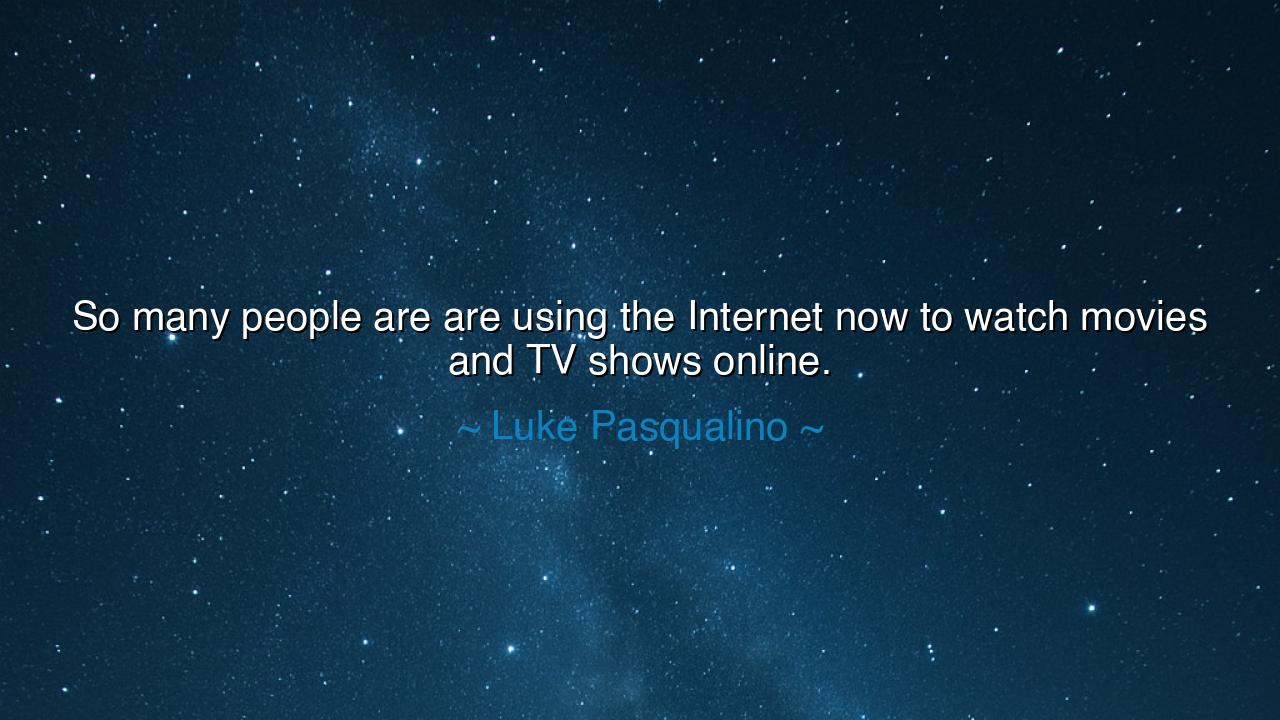
So many people are are using the Internet now to watch movies






Luke Pasqualino’s words, "So many people are using the Internet now to watch movies and TV shows online," offer a reflection on the profound transformation of how we engage with stories and entertainment. In these simple words lies the recognition of an immense shift in the way humanity consumes art. Once confined to theaters, living rooms, and televisions, movies and television shows have now become accessible to millions with the click of a button, thanks to the vast expanse of the Internet. Pasqualino’s statement is not just an observation but a recognition of how technology has revolutionized our relationship with the narratives that shape our lives, our cultures, and our societies.
In the ancient world, the act of storytelling was deeply ritualistic and communal. Homer’s epics, for instance, were recited by bards, and theater performances were public events, attended by thousands in amphitheaters where stories were shared, witnessed, and lived through. The Iliad and the Odyssey, despite their immense historical significance, were not just works of literature; they were the lifeblood of a civilization, passed down orally from one generation to the next. The audience did not have the luxury of watching a story in private, nor did they have the ability to choose when and where to experience it. Instead, they were compelled by shared experience, gathered together to witness the same narrative at the same moment, feeling the emotions of the story as a collective.
But as civilizations evolved, so too did the ways in which stories were told and shared. The invention of the printing press in the 15th century marked the beginning of a new era in storytelling—one where stories could be preserved in written form, distributed far and wide, and consumed privately by the individual. Just as the Greeks were the first to put drama into public space, Gutenberg’s press opened the door for personalized consumption. The ability to read a book at one's leisure, rather than relying on a communal experience, forever altered our relationship with stories. But it was not until the 20th century, with the advent of film and television, that the shared experience of watching stories would again become personal, even as the medium became more universal.
The Internet, in its vast and sweeping change, has taken this personalization and magnified it a hundredfold. It allows us to select, with unparalleled ease, which movies and TV shows we wish to consume, at any time of day or night, and from any place on Earth. No longer do we gather around a fire or in a theater to hear a tale. The power to choose, to engage with entertainment on our own terms, has placed the viewer at the center of the experience. This shift from communal to individual consumption of stories is not just a matter of convenience; it speaks to a deeper change in how we connect with art and with each other. Through the Internet, we not only consume stories but shape them, curating our own experiences in a way that was once unimaginable.
Yet, with all the freedom the Internet offers, Pasqualino’s statement also serves as a reminder of something deeper—the collective nature of art. While digital platforms have granted us unprecedented access to stories, there remains something powerful in the shared experience of watching a film or television show with others. Think of the gladiatorial games in ancient Rome, where thousands gathered to watch, to witness, and to share in the thrills of combat. While the Internet allows us to experience stories in solitude, it can sometimes make us lose sight of the power of shared experience, the energy that comes from participating in a narrative together, feeling united through a common story.
Consider the rise of social media and online forums, which have allowed us to rediscover communal experiences in the digital age. Live-streaming events, the collective binge-watching of a television series, or the shared excitement of a movie premiere, are examples of how the Internet has provided a new kind of collective experience, where individuals can still connect and discuss stories in real-time. This balance of individual choice and communal connection is what makes the digital era so unique, and it is what makes the act of consuming media in this new world so exciting, and sometimes even overwhelming.
The lesson here, like the lessons of ancient storytelling, is one of balance. The Internet offers us great freedom to explore stories in a way that was previously impossible. We must take care, however, not to lose the shared essence of storytelling—the power that lies in experiencing something together, in feeling emotions collectively. While we enjoy the privileges of personal choice in our viewing habits, we must also remember that stories have the power to unite, to bring us together, to make us feel less alone. As we move forward in this digital age, let us use the freedom of the Internet to enhance, not replace, the community that has always been at the heart of the human experience. We are citizens of a world where the power of story can reach us in ways never before possible—may we use it wisely, to connect, to grow, and to share in the beauty of being human.






AAdministratorAdministrator
Welcome, honored guests. Please leave a comment, we will respond soon